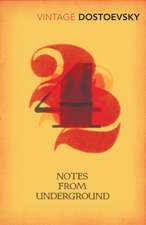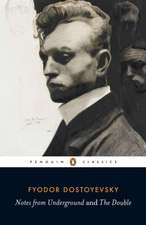Notes from the Underground
Autor Fyodor Dostoyevskyen Limba Engleză Paperback
Preț: 63.66 lei
Puncte Express: 95
Preț estimativ în valută:
11.26€ • 13.27$ • 9.84£
11.26€ • 13.27$ • 9.84£
Carte disponibilă
Livrare economică 14-28 martie
Specificații
ISBN-13: 9781535558235
ISBN-10: 1535558237
Pagini: 82
Dimensiuni: 152 x 229 x 4 mm
Greutate: 0.12 kg
ISBN-10: 1535558237
Pagini: 82
Dimensiuni: 152 x 229 x 4 mm
Greutate: 0.12 kg
Descriere
Descriere de la o altă ediție sau format:
Published in 1864, Notes from Underground is considered the author's first masterpiece - the book in which he "became" Dostoevsky - and is seen as the source of all his later works. Richard Pevear and Larissa Volokhonsky, whose acclaimed translations of The Brothers Karamazov and Crime and Punishment have become the standard versions in English, now give us a superb new rendering of this early classic. Presented as the fictional apology and confession of the underground man - formerly a minor official of mid-nineteenth-century Russia, whom Dostoevsky leaves nameless, as one critic wrote, "because 'I' is all of us" - the novel is divided into two parts: the first, a half-desperate, half-mocking political critique; the second, a powerful, at times absurdly comical account of the man's breakaway from society and descent "underground." The book's extraordinary style - brilliantly violating literary conventions in ways never before attempted - shocked its first readers and still shocks many Russians today. This magnificent new translation captures for the first time all the stunning idiosyncrasy of the original.
Published in 1864, Notes from Underground is considered the author's first masterpiece - the book in which he "became" Dostoevsky - and is seen as the source of all his later works. Richard Pevear and Larissa Volokhonsky, whose acclaimed translations of The Brothers Karamazov and Crime and Punishment have become the standard versions in English, now give us a superb new rendering of this early classic. Presented as the fictional apology and confession of the underground man - formerly a minor official of mid-nineteenth-century Russia, whom Dostoevsky leaves nameless, as one critic wrote, "because 'I' is all of us" - the novel is divided into two parts: the first, a half-desperate, half-mocking political critique; the second, a powerful, at times absurdly comical account of the man's breakaway from society and descent "underground." The book's extraordinary style - brilliantly violating literary conventions in ways never before attempted - shocked its first readers and still shocks many Russians today. This magnificent new translation captures for the first time all the stunning idiosyncrasy of the original.
Notă biografică
Fyodor Mikhailovich Dostoevsky[a] (11 November 1821 - 9 February 1881), sometimes transliterated Dostoyevsky, was a Russian novelist, short story writer, essayist, journalist and philosopher. Dostoevsky's literary works explore human psychology in the troubled political, social, and spiritual atmospheres of 19th-century Russia, and engage with a variety of philosophical and religious themes. His most acclaimed works include Crime and Punishment (1866), The Idiot (1869), Demons (1872), and The Brothers Karamazov (1880). Dostoevsky's body of works consists of 11 novels, three novellas, 17 short stories, and numerous other works. Many literary critics rate him as one of the greatest psychologists in world literature.[3] His 1864 novella Notes from Underground is considered to be one of the first works of existentialist literature. Born in Moscow in 1821, Dostoevsky was introduced to literature at an early age through fairy tales and legends, and through books by Russian and foreign authors. His mother died in 1837 when he was 15, and around the same time, he left school to enter the Nikolayev Military Engineering Institute. After graduating, he worked as an engineer and briefly enjoyed a lavish lifestyle, translating books to earn extra money. In the mid-1840s he wrote his first novel, Poor Folk, which gained him entry into St. Petersburg's literary circles. Arrested in 1849 for belonging to a literary group that discussed banned books critical of Tsarist Russia, he was sentenced to death but the sentence was commuted at the last moment. He spent four years in a Siberian prison camp, followed by six years of compulsory military service in exile. In the following years, Dostoevsky worked as a journalist, publishing and editing several magazines of his own and later A Writer's Diary, a collection of his writings. He began to travel around western Europe and developed a gambling addiction, which led to financial hardship. For a time, he had to beg for money, but he eventually became one of the most widely read and highly regarded Russian writers.





















